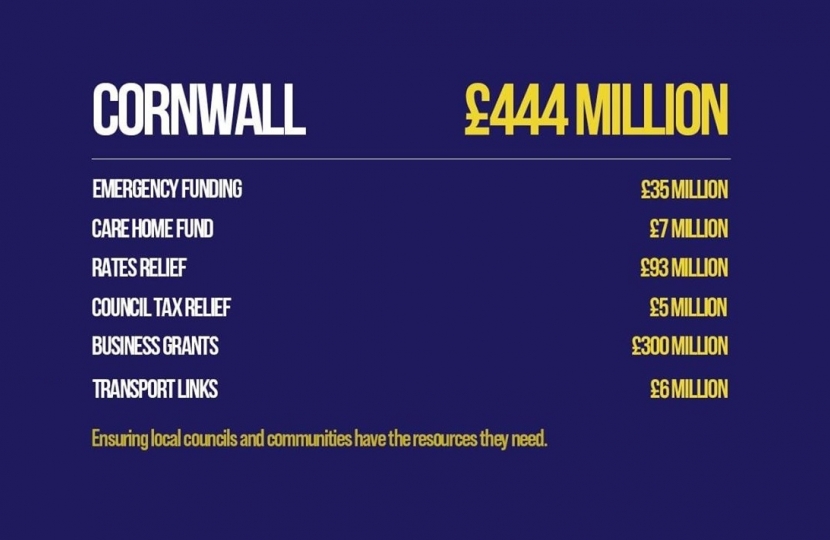
Communities and businesses across Cornwall have benefited from £444m in government funding since the beginning of the Coronavirus pandemic, helping to support some of the most vulnerable people, alongside the sectors that have been hardest hit.
In total, the Government has announced almost £27 billion for local communities since the start of March. This includes billions of pounds in grants for small businesses and business rates reliefs for industries such as hospitality and leisure that have not been able to operate during lockdown.
As part of this, local authorities across England have received an unprecedented level of additional support, sharing £3.2 billion in direct grants of which £35m has gone to Cornwall Council, and a further £600 million to help prevent transmission in care settings. This has meant local councils have had the resources they need to respond to any additional pressures created by coronavirus and been able to continue providing essential services, such as adult social care and children’s services.
Commenting, North Cornwall MP, Scott Mann said:
"Along with the five other Cornish MPs, I have been involved throughout shaping the financial packages to help support all of Cornwall's residents.
"It's easy to look at big numbers and dismiss them, but my office is hearing every day about individuals and businesses who have been helped financially during this crisis."
Commenting, Communities Secretary Robert Jenrick said:
“We said at the start of the pandemic that we would make sure our councils and communities had the resources they need to respond to the coronavirus, and that’s exactly what we have done.
“In total, we have provided almost £27 billion to help local communities weather this difficult period, providing additional financial support in the form of grants, business rates relief and direct support for councils on a scale that is unprecedented in living memory.
“Council workers across the country are working tirelessly to ensure this support gets to where it needs to be, helping local people and businesses to navigate this difficult period. They are the unsung heroes of this crisis and we are all incredibly grateful for the huge contribution they are making to their communities.
- The Government has provided £27 billion since the start of the pandemic to support councils and communities through Covid-19. This includes direct support for local authorities, additional support for social care, discretionary local authority grants, £9.7 billion in business rates reliefs for hard hit sectors, a £500 million council tax hardship fund and £12.3 billion in small business grants (MHCLG, Twitter, 20 May 2020, link; Robert Jenrick, Twitter, 20 May 2020, link).
- The Government has given local councils an extra £3.2 billion to deal with extra costs associated with coronavirus. This is an unprecedented level of additional financial support in recent times and builds on the increase to council Core Spending Power that came into effect for 2020-21 from April – a rise of £3 billion on 2019-20. This meant that even before the coronavirus, there was more money available for council leaders to deliver local priorities (MHCLG, Press Release, 18 April 2020, link; MHCLG, Final local government finance settlement 2020 to 2021, 6 February 2020, link).
- A further £600 million has been made available to reduce transmission in care homes, taking total government support for local authorities to £3.8 billion. A £600 million Infection Control Fund has been introduced to tackle the spread of COVID-19 in care homes in addition to £3.2 billion of financial support made available to local authorities to support key public services since the start of the crisis. The fund, which is ringfenced for social care, will be given to local authorities to ensure care homes can continue to halt the spread of coronavirus by helping them cover the costs of implementing measures to reduce transmission (MHCLG, Press Release, 15 May 2020, link).
- Local authorities will also benefit from £300 million to develop test and tracing services in their local communities. £300 million will be provided to all local authorities in England to develop and action their plans to reduce the spread of the virus in their area. Work on the plans will start immediately. Their plans will focus on identifying and containing potential outbreaks in places such as workplaces, housing complexes, care homes and schools (DHSC, Press Release, 22 May 2020, link).
- The Government has provided councils greater financial relief by allowing them to defer £2.6 billion in business rates payments and by paying £850 million in social care grants up front. These measures mean councils will be able to defer £2.6 billion of payments they are due to make to central government over the next three months as part of the business rates retention scheme. Additionally, the Government will bring forward care grant payments to councils worth £850 million for both children and adults. These were paid in one lump sum, rather than monthly in April, May and June, helping provide immediate support for core frontline social care services (MHCLG, Press Release, 16 April 2020, link).
- We have offered support to 90 per cent of rough sleepers known to local authorities, with offers of safe accommodation, keeping them safe from coronavirus. More than 5,400 vulnerable rough sleepers have so far been helped off the streets and from communal shelters during the pandemic – and we have offered support to more than 90 per cent of the total number of rough sleepers known to local authorities. We are working with councils to ensure all those people who are still sleeping rough are housed in safe accommodation as soon as possible. (Robert Jenrick, Twitter, 26 April 2020, link; MHCLG, Press Release, 18 April 2020, link; MHCLG, Correspondence, 27 March 2020, link).
- Councils are providing more than a million boxes of essential supplies to people who are medically vulnerable and unable to leave their homes. The Government is delivering essential supplies to extremely medically vulnerable people in England in an operation on a scale not seen since the Second World War. The packages, which are being left on people’s doorsteps, are paid for by central government and contain essential food and household items such as pasta fruit, tea bags, tinned goods and biscuits for those who need to self-isolate at home but have no support network of family or friend to help them (Robert Jenrick, Twitter, 26 April 2020, link; MHCLG, Press Release, 6 May 2020, link).


